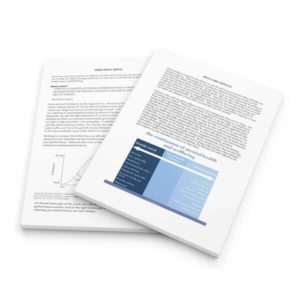When I first studied undergraduate psychology twenty-five years ago, mental health issues & illness were still a socially taboo subject. When I began working as an employment counsellor 18 years ago, stigma, stereotyping and at times blatant discrimination, was rife.
Do we need to stop talking about mental health issues?
In the time since, we have seen targeted awareness raising programs in Australia which have helped improve our collective mental health literacy. There is still more to do. There are still some people who hold outdated ideas about mental health issues.
But, many people now understand that mental health is an integral part of health. They understand that so many of us will experience mental health issues in our lives (1 in 5 of us in a year, and close to half of us in our lifetime).
We now hear people talking more openly about mental health issues in families, communities and workplaces. However, it is time to stop talking about mental health issues and start talking about mental wellbeing.
Current approach
An Illness Model
Our society generally approaches mental health from an illness model. We focus on diagnosis, medicalisation and clinical services. We don’t have enough of these services.
For example, Victorian research indicates alarmingly increased levels of young people seeking emergency treatment for mental disorders, with a 46% increase in recent years.
People in Need
There are people in dire need of treatment and care, families who are distressed and isolated and not able to access support. We do not have enough services to meet the current demands. People are dying and it’s not only patients and their families who are struggling.
Dedicated Professionals
We have many dedicated health professionals working in these systems who are burnt-out and straining to meet the complex needs of their patients in an under resourced system. For some of these professionals, it is to the detriment of their own mental wellbeing.
We Need More
There is no denying that in our communities there are some brilliant services, working positively to enhance the experience of those living with mental health issues and their families. We have community-based service providers who work tirelessly with limited resources to help people living with mental health issues recover and engage in roles that are meaningful to them.
But, this is not enough.
We’re Missing an Opportunity
If we only focus on either treatment or on awareness raising, we are missing the opportunity to actually reduce prevalence, to reduce harm, and to save lives now and into the future.
We currently take a Band-Aid approach to address mental health issues, dominated by a short-term view of controlling symptoms. Instead we need a revolutionary change to a preventative model.
We do need to increase supports and resources available to those people experiencing current mental health issues. But we can’t just keep talking about issues when they present. We also need to prevent mental health issues occurring where possible. We need to prioritise mental wellbeing.
3 Mental Health Steps for Positive Change
Here are three steps we could take immediately to make a positive change:
- Start young. We need to educate our kids about the importance or mental wellbeing – just as we do with food pyramids and the benefits of physical activity. The government has committed some funds to new programs but more needs to be done.
- Business and industry needs to play a part. Employee mental wellbeing needs to become part of the culture and fabric of every Australian workplace.
- Parents and carers need more support and education about mental health and wellbeing.
We Need To…
We need to make this a sexy election issue so it gets properly funded. Although, it’s not even as simple as that. We can’t idly wait for governments to fund proactive mental wellbeing programs.
We need to take steps to build mental wellbeing in our workplaces, in our communities, in our families, and most significantly, within ourselves. If we don’t begin focussing on, funding and personally prioritising mental wellbeing, we will never reduce the rates of mental illness.
We need to start today.
References
Mental Health Australia and KPMG Report: Investing to Save. May 2018
-
 Healthy Minds, Flourishing Workplaces | eLearning Course$198.00 inc.GST
Healthy Minds, Flourishing Workplaces | eLearning Course$198.00 inc.GST -
 Building Buoyancy | eLearning Course*$180.00 inc.GST
Building Buoyancy | eLearning Course*$180.00 inc.GST -
 Workplace Education Pack$1,650.00 inc.GST
Workplace Education Pack$1,650.00 inc.GST
Tap into our mental health expertise
Image: Hannah Busing (Unsplash)



